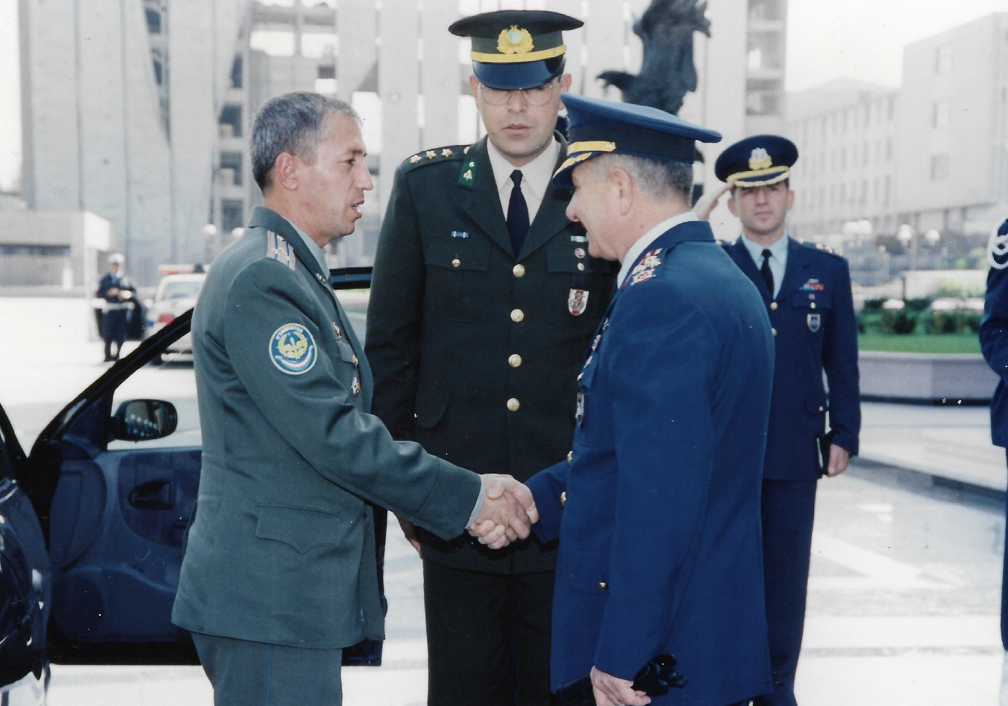Lifestyle
Saydulla Madaminov – Life of a veteran

The 4th Commander of Uzbekistan Air and Air Defence Forces, a 3rd, 2nd, 1st class of military pilot with a ‘Pilot Sniper’ badge, a squadron leader, serving as the Commander of the 735th Aviation Regiment, or doing international visits as Commander of the Uzbek Air Force to Turkey, US, Russia, UK, and Italy, Colonel Madaminov has it all have the title of a veteran. He has experienced the scent of what the Air Force Mission truly circumscribes.
Saydulla Abdukuddusovich Madaminov is a retired colonel of Uzbekistan who also served as the 4th commander of Uzbekistan Air and Air Defence Forces from 2001 to 2003.
Born to be in the Air Force
Saydullah Madaminov was born in 1957, in Osh, Kirghiz SSR. His career, life, and battles have set a list of achievements and have made him an inspirational role model for generations to come in the Air Force.
He received his education from Yeisk Higher Military Aviation Institute (EVVAUL) from 1974 to 1978. He was sent to the Transbaikal Military District upon graduation, where he joined the 23rd Air Army, first at Step and then at Dzhida in 1980. In 1982, he was promoted to flight commander. In 1983, he got transferred to Brand Airbase in East Germany to join the GSFG. By 1987, he rose to become a squadron leader.
Undeniable contributions
Saydullah earned an additional military degree from the Gagarin Air Force Academy in Monino from 1988 to mid-1991. After successfully acquiring his second tertiary degree. Saydullah, as a powerful force, didn’t stop there; there was still more to come for him. He then continued his Soviet Military Service at the Turkestan Military District. Then came the summer of 1991, when he arrived at the Khanabad Air Base and became the Chief of staff and the First Deputy to the Commander of the 735th Aviation Regiment. After the collapse of the USSR, by 1993, the Soviet Military Authority went downhill in Uzbekistan, ultimately leading to the appointment of Saydullah as the Commander of the 735th aviation regiment, which in August of 1995 was re-named the 60th Aviation Regiment of the then newly formed Uzbek Air Defence Forces. The freshly established Uzbek military was re-arranged. Khanabad Air Base became the most extensive air force base in the country.
Cementing the legacy
The mid-90s saw the emergence of the Tajik Civil War, which embroiled the Uzbek Air Force; Colonel Madaminov successfully carried out over 120 sorties targeting the Islamic extremist. Then in the late 90s, he participated in military operations, successfully neutralizing the IMU fighters who had taken over some mountainous areas in the northern Surxondaryo and launched an incursion into the Batken and Osh regions of Kyrgyzstan.
In March 1999, the Ministry of Defense transferred Saydulla to the capital Tashkent, where he was promoted to the Deputy Commander of the Uzbek Air and Air Defence Forces. In October 2001, by decree of President Islam Karimov, Colonel Madaminov was appointed the Commander of the Uzbekistan Air and Air Defence Forces. He executed that role until late 2003. After that, his journey as a senior military advisor and inspector for the Ministry of Defense of Uzbekistan began. Saydullah retired from the Military in August 2007.
Colonel Saydulla had received Medal “For Distinction in Military Service” and “Jasorat.” He received the “Shon-Sharaf Order,” or The Order of Glory, for his devotion and courage in defending the country and strengthening Uzbekistan’s defense and national security.
Throughout his career, he has mastered aircraft including L-29, L-39, MiG-15, MiG-17, MiG-23, Su-7, Su-17, Su-24, An-26, and Yak-42. He has taken 10,274 flights and spent total flight hours of 4072 during military service and 770 in commercial aviation.
Legacy Continues
After retiring from the military, Saydulla turned to civil aviation. He worked as a Yak 42 Captain for Tulpar Air from 2011 and 2013. Initially, he was located in Kazan but later relocated to Vnukovo Airport in Moscow. Before fully retiring from all aviation work and moving back to Uzbekistan, Saydullah became the Deputy Head of Gosaviandzor for the North Caucasian Federal District in 2014. He worked from the Mineralnye Vody Airport and held that position until late 2021.
Lifestyle
The Missing Piece in Self-Help? Why This Book is Changing the Wellness Game

Self-help shelves are full of advice — some of it helpful, some of it recycled, and most of it focused on “mindset.” But Rebecca Kase, LCSW and founder of the Trauma Therapist Institute, is offering something different: a science-backed, body-first approach that explains why so many people feel struck, overwhelmed, or burned out — and what they can actually do about it.
A seasoned therapist and business leader, Kase has spent nearly two decades teaching others how to navigate life through the lens of the nervous system. Her newest book, “The Polyvagal Solution,” set to release in May 2025, aims to shake up the wellness space by shifting the focus away from willpower and onto biology. If success has felt out of reach — or if healing has always seemed like a vague concept — this book may be the missing link.
A new way to understand stress and healing
At the heart of Kase’s approach is polyvagal theory, a neuroscience-based framework that helps explain how our bodies respond to safety and threat. Developed by Dr. Stephen Porges, polyvagal theory has transformed the way many therapists understand trauma, but Kase is bringing this knowledge to a much wider audience.
“The body always tells the truth,” Kase says. “If you’re anxious, exhausted, or always in overdrive, your nervous system is asking for support, not more discipline.”
“The Polyvagal Solution” makes this complex theory digestible and actionable. Instead of promising quick fixes, Kase offers strategies for regulating the nervous system over time, including breathwork, movement, boundaries, and daily practices that better align with how the human body functions. It’s less about pushing through discomfort and more about learning to tune in to what the body needs.
From clinical expertise to business insight
What sets Kase apart isn’t just her deep understanding of trauma but how she blends that knowledge with real-world experience as a business owner and leader. As the founder of the Trauma Therapist Institute, she scaled her work into a thriving company, all while staying rooted in the values she teaches.
Kase has coached therapists, executives, and entrepreneurs who struggle with burnout, anxiety, or feeling disconnected from their work. Regardless of who she works with, though, her message remains consistent: the problem isn’t always mindset — it’s often regulation.
“Success that drains you isn’t success. It’s survival mode in disguise,” Kase explains. Her coaching programs go beyond traditional leadership training by teaching high achievers how to calm their nervous systems, enabling them to lead from a grounded place, not just grit.
Making the science personal
For all her clinical knowledge, Kase keeps things human. Her work doesn’t sound like a lecture but rather like a conversation with someone who gets it. That’s because she’s been through it herself: the long hours as a therapist, the emotional toll of supporting others, the realities of building a business while managing her own well-being.
That lived experience informs everything she does. Whether she’s speaking on stage, running a retreat, or sharing an anecdote on her podcast, Kase has a way of weaving humor and honesty into even the heaviest topics. Her ability to balance evidence-based practice with practical advice is part of what makes her voice so compelling.
Kase’s previous book, “Polyvagal-Informed EMDR,” earned respect from clinicians across the country. But “The Polyvagal Solution” reaches beyond the therapy community to anyone ready to understand how their body is shaping their behavior and how to create real, sustainable change.
Why this message matters
We’re in a moment where burnout is common and overwhelm feels normal. People are looking for answers, but many of the tools out there don’t address the deeper cause of those feelings.
That’s where Kase’s work lands differently. Instead of telling people to “think positive” or “try harder,” she teaches them how to regulate their own biology. And in doing so, she opens the door for deeper connection, better decision-making, and more energy for the things that matter.
As more workplaces begin to embrace trauma-informed leadership, more individuals are seeking solutions that go beyond talk therapy and motivational content. Kase meets that need with clarity, compassion, and a toolkit rooted in both science and humanity.
A grounded approach to lasting change
What makes “The Polyvagal Solution” stand out is its realism. It doesn’t ask readers to overhaul their lives but instead asks them to listen — to pay attention to how their bodies feel, how their stress patterns manifest, and how even small shifts in awareness can lead to significant results over time. Whether you’re a therapist, a team leader, or someone trying to feel more at ease in your own skin, this book offers a way forward that feels both grounded and achievable.
Rebecca Kase isn’t just adding another title to the self-help genre. She’s redefining it by reminding us that we don’t have to muscle our way through life. We just have to learn how to work with, not against, ourselves.
And maybe that’s the real game-changer we’ve been waiting for.
-

 Tech4 years ago
Tech4 years agoEffuel Reviews (2021) – Effuel ECO OBD2 Saves Fuel, and Reduce Gas Cost? Effuel Customer Reviews
-

 Tech6 years ago
Tech6 years agoBosch Power Tools India Launches ‘Cordless Matlab Bosch’ Campaign to Demonstrate the Power of Cordless
-

 Lifestyle6 years ago
Lifestyle6 years agoCatholic Cases App brings Church’s Moral Teachings to Androids and iPhones
-

 Lifestyle4 years ago
Lifestyle4 years agoEast Side Hype x Billionaire Boys Club. Hottest New Streetwear Releases in Utah.
-

 Tech7 years ago
Tech7 years agoCloud Buyers & Investors to Profit in the Future
-

 Lifestyle5 years ago
Lifestyle5 years agoThe Midas of Cosmetic Dermatology: Dr. Simon Ourian
-

 Health6 years ago
Health6 years agoCBDistillery Review: Is it a scam?
-

 Entertainment6 years ago
Entertainment6 years agoAvengers Endgame now Available on 123Movies for Download & Streaming for Free
